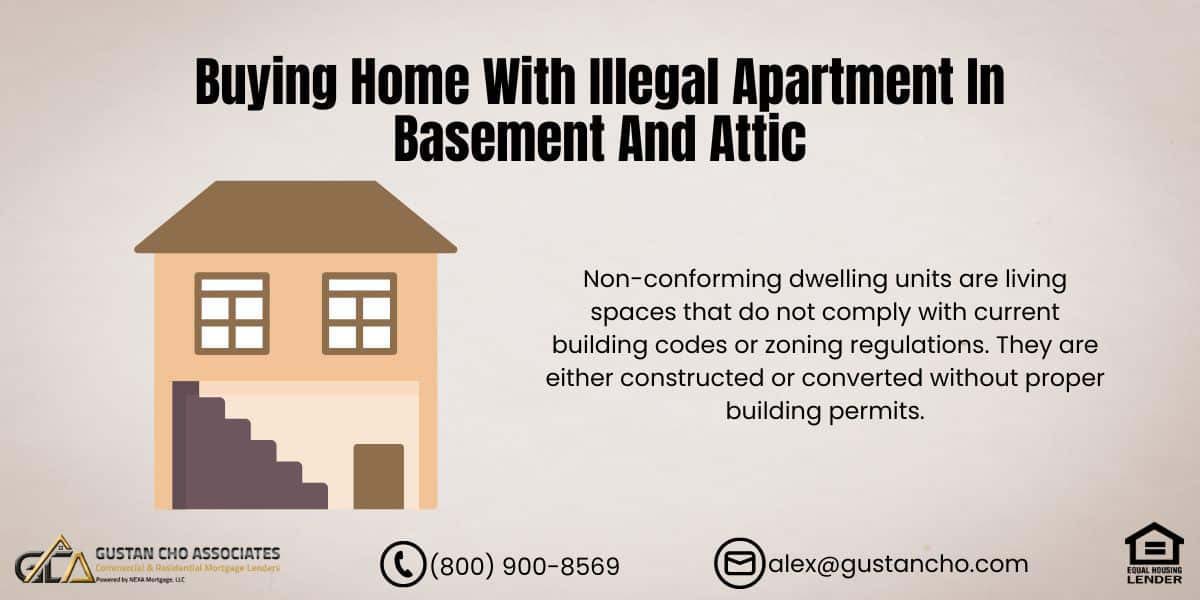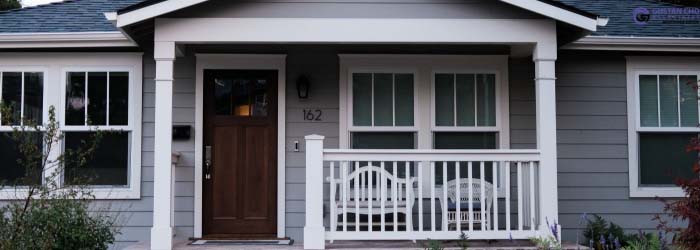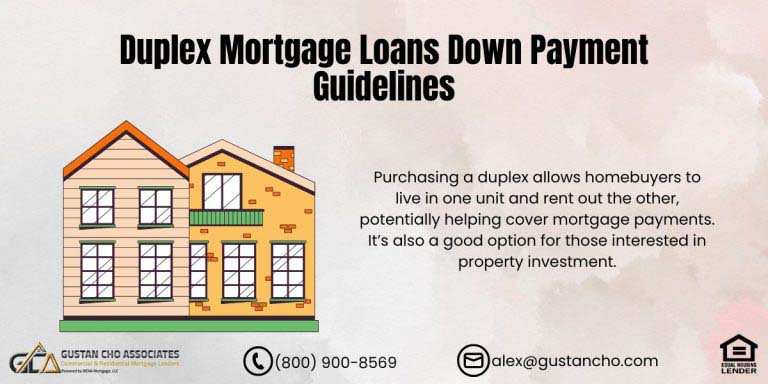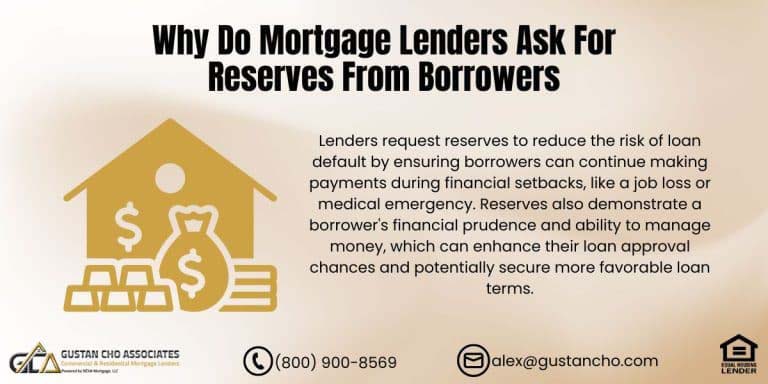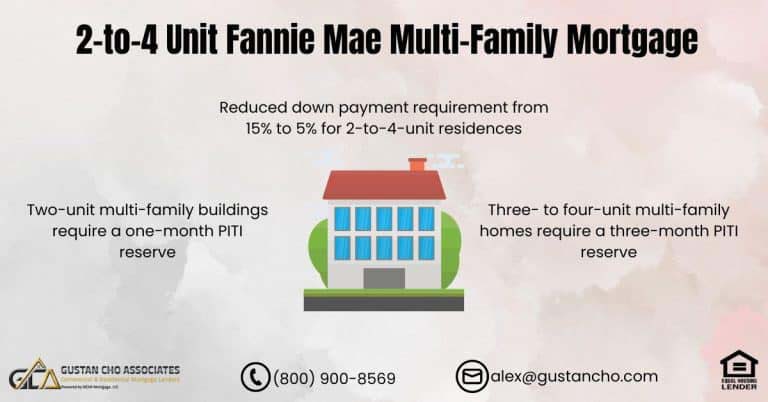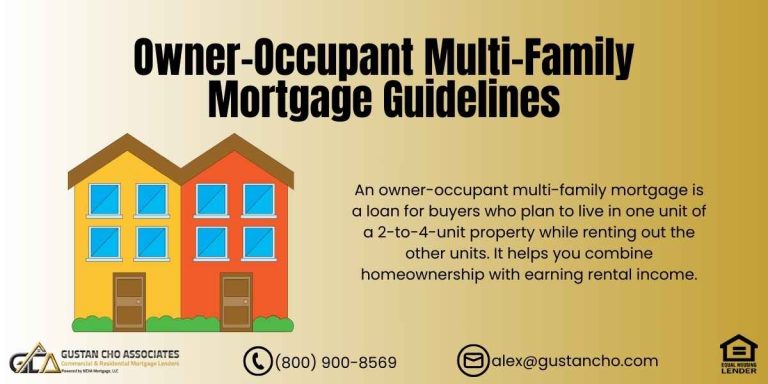This blog will discuss the intricacies of buying home with illegal apartment in the basement and attic.
Most of these non-conforming dwelling units have been constructed without proper building permits. Despite having these additional units, properties still need to be classified as two-unit residential buildings, not three-unit. The same applies to attics, where many homeowners have converted unfinished spaces into rental units without obtaining the necessary permits.
How do mortgage lenders view these illegal, non-conforming dwelling units? Can home buyers still purchase and get financing for two-unit buildings with non-conforming basements and attics?
Buying Home With Illegal Apartment In Basement In Chicago
In Chicago, two-unit multi-family properties are commonly referred to as two flats. Many of these buildings include in-law apartments, which homeowners rent out for additional income. Most non-legal units feature a fully functional kitchen, bedrooms, bathrooms, living areas, and two separate entrances. When considering buying a home with an illegal apartment, it’s important to be aware of these common setups and their implications.
Thinking About Buying a Home with an Illegal Apartment? Let Us Help You Navigate the Process!
Contact us today to learn about the steps involved and how to move forward with your home purchase.
Are Basement Apartments Legal in Chicago?
When considering buying home with illegal apartment, it’s essential to understand that basement apartments in Chicago can be legal. Still, they must adhere to specific building codes and zoning regulations. Here are some general requirements:
- Ceiling Height: The minimum ceiling height required is 7 feet.
- Egress: There must be a safe means of egress, such as a door or window, in an emergency.
- Light and Ventilation: A sufficient amount of natural light and ventilation must be present.
- Plumbing and Electrical: The apartment must meet all plumbing and electrical codes.
- Occupancy Permits: The property owner may need an occupancy permit for the basement apartment.
Suppose you’re buying home with illegal apartment. In that case, it is crucial to check with the Chicago Department of Buildings and local zoning ordinances for the most accurate and current information. Getting advice from a nearby attorney or building inspector can also guarantee that all legal obligations are fulfilled.
Non-Conforming Basements and Attics For Family Living Quarters
Most of them have electrical, water, and gas meters connected to one of the other units. Most non-conforming basement apartments have a lower ceiling height. Unfortunately, a large percentage of two and three-unit multi-family residential homes have an apartment in basements and attics.
Even though the homeowners are collecting rent, they cannot be classified as additional units. No rental income can be used even though the tenant has a lease. Most municipalities do not enforce this code violation and it is very common, especially in the city of Chicago.
Financing Multi-Unit With Non-Conforming Apartment
A home buyer purchasing a home with an in-law suite apartment that is not legal can still get financing. They can close on their prospective home purchase with illegal living units. Again, buying a home with an apartment unit that does not conform is very common in Chicago.
A large percentage of two to four units have non-legal basement apartments. Many homes have dormers where homeowners converted to apartments. This practice of converting storage into apartments without proper building permits in Chicago has been going on for decades.
Enforcement by City Building Inspectors
Most of the time, city building inspectors do not enforce illegal housing units. Local lenders who finance homes with dwelling units that have been converted illegally think nothing of this. However, many times, the appraiser will require that the kitchen be disassembled or the gas, electricity, and water be disconnected. Will classify the non-permitted apartment in the basement or attic as a storage space and/or recreation room. Sellers do not have to demolish the kitchen. But every hookup in the kitchen needs to be disconnected and the kitchen cannot be functional.
How Lenders View Illegal Basements and Attics
Lenders will just consider storage spaces converted to living spaces as a remodeled recreational area. Should have no problem in getting a mortgage loan approval. This is the case when homeowners are collecting rent. Rental income that owners get from these living spaces will not count as qualified income
Update On Buying Home With Illegal Apartment As Rental Units Without Permits
Lenders will still finance two to four-unit properties with basement apartments and attics that have been converted to apartments or in-law suites without building permits. However, appraisers may ask that you disconnect the kitchen and just count that space as a recreation room or storage area.
Buying a Home with an Illegal Apartment? Understand the Risks and Find Your Solution!
Contact us today to find out how we can help you navigate the complexities of buying a home with an illegal unit.
How to Report an Illegal Basement Apartment in Chicago?
To report an illegal basement apartment in Chicago, you can follow these steps:
- Contact 311: The easiest way to report an illegal basement apartment is by calling 311, Chicago’s non-emergency services line. You can also visit the 311 website or use the 311 app to file a complaint.
- Provide Detailed Information: When making the report, be prepared to provide detailed information about the property, including the address and the nature of your concerns. The more specific you are, the better.
- Follow-Up: When you file the complaint, you can request a service request number, which allows you to follow up on the status of your report.
- Contact the Department of Buildings: You can directly contact the Chicago Department to report the issue. They have a specific process for handling complaints about illegal dwelling units. Their contact information can be found on the Chicago Department of Buildings website.
- Anonymous Reporting: You can make a report without r if you prefer not to reveal your identity. However, sharing your contact details can be beneficial if more information is required.
By following these steps, you can help ensure that the appropriate city authorities address illegal basement apartments.
If you have any questions about Buying Home With Illegal Apartment In Basement And Attic or you need to qualify for loans with a lender with no overlays, please contact us at 800-900-8569. Text us for a faster response. Or email us at alex@gustancho.com. The team at Gustan Cho Associates is available 7 days a week, on evenings, weekends, and holidays.
FAQs: Buying Home With Illegal Apartment In Basement And Attic
- 1. What are non-conforming dwelling units? Non-conforming dwelling units are living spaces that do not comply with current building codes or zoning regulations. They are either constructed or converted without proper building permits.
- 2. Can I get financing for a home with an illegal basement or attic in Chicago? Yes, it is possible to obtain financing for a home with an illegal basement or attic. However, lenders may require that these spaces be classified as storage or recreational areas, and certain modifications (like disconnecting a kitchen) may be necessary.
- 3. Are basement apartments legal in Chicago? Basement apartments can be legal in Chicago if they comply with specific building codes and zoning regulations. This includes requirements for ceiling height, egress, light and ventilation, plumbing, electrical systems, and occupancy permits.
- 4. What are the general requirements for legal basement apartments in Chicago? The space must have a minimum ceiling height of 7 feet. In case of an emergency, a safe means of egress, such as a door or window, is essential. Adequate natural light and ventilation are required. All plumbing and electrical systems must comply with the relevant codes. Additionally, obtaining the necessary occupancy permits from the city is mandatory.
- 5. How do mortgage lenders view illegal, non-conforming dwelling units? Mortgage lenders often view illegal, non-conforming dwelling units as storage or recreational areas rather than additional living units. This means that rental income from these units cannot be used to qualify for a mortgage, and certain modifications may be required for financing.
- 6. Can rental income from illegal basement or attic apartments be used to qualify for a mortgage? No, rental income from illegal basement or attic apartments cannot be used as qualifying income for a mortgage.
- 7. How do city building inspectors handle illegal housing units? City building inspectors in Chicago often do not enforce violations related to illegal housing units. However, if an appraiser identifies the issue, modifications such as disconnecting the kitchen may be required.
- 8. What should be done if an appraiser identifies an illegal basement or attic apartment? The appraiser may require that the kitchen be disassembled or disconnected and the space reclassified as storage or a recreational room.
- 9. How can I report an illegal basement apartment in Chicago? To file a complaint about an illegal apartment, call 311, visit the 311 website, or use the 311 app. When filing your complaint, make sure to include the address and specific details about the issue. It’s also a good idea to request a service request number so you can follow up on the status of your complaint later. Additionally, you have the option to report directly to the Chicago Department of Buildings. While you can report anonymously, providing contact details may be helpful if additional information is needed.
- 10. Is it common for two- and three-unit homes in Chicago to have illegal basement or attic apartments? Yes, it is common for two- and three-unit homes in Chicago to have illegal basement or attic apartments. For decades, many homeowners have converted these spaces into rental units without proper permits.
This blog about Buying Home With Illegal Apartment In Basement And Attic was updated on May 21st, 2024.
Worried About an Illegal Apartment in Your Home Purchase? We’re Here to Help!
Contact us today to explore your options and make the right decision for your home purchase.


